War
Then the war began. The Soviets kept withdrawing, and eventually the front line slid over the great-grandmother's house. They were hiding in a cellar at that moment but could perfectly hear all the shots and blasts, and someone yelling “vorwärts!”, and then someone yelling “vpered!”, and then “vorwärts!” again, and so on, in circles. And then just yelling — a Russian soldier with a blasted belly was dying in their backyard, and he cried for a really long time. They were afraid to crawl out and help him.
Both great-grandmother and grandmother told me this story separately in practically similar words, and more than once.
They have never said anything about life under the Nazis. Thus we can only look at the pictures from that time. Apparently, life was not that bad.
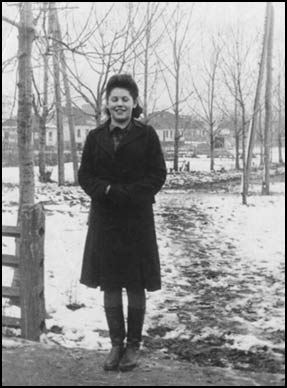
Yes, the Nazis are already here. And have even brought their own photographic supplies — the stamp on the reverse of this shot says “Agfa”, something not available in the Soviet Union.
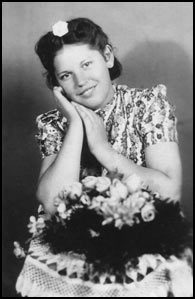
A studio photo
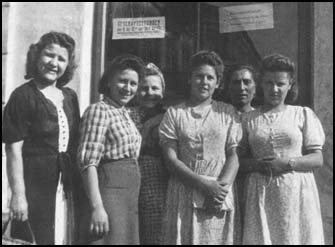
The sign says “Geschäftsstunden”. Grandmother is the third from the right.
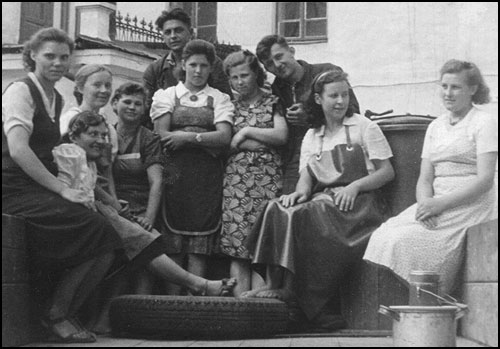
Working for the Nazis, I guess. Grandmother is above the spare wheel.
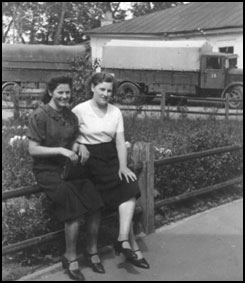
A Nazi truck. Grandmother is on the left.
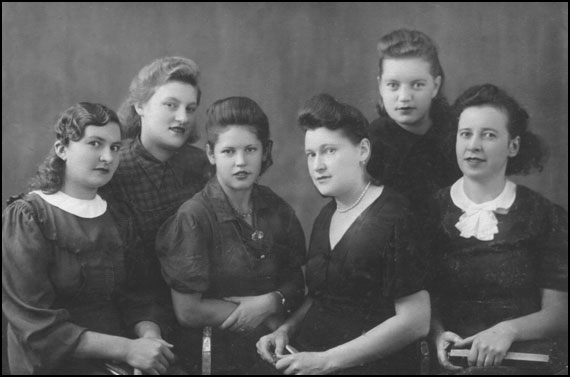
An inscription on the reverse: “Remember our girls, May 15, 1942.” Grandmother is the third from the left. I do not know anyone else here.
And yet, they all ended up in a German prison camp. Apparently, they were forcefully moved out of the Soviet Union, to Poland first, for labor. That happened in 1943, I believe, when the Soviets were counterattacking in full force and gradually pushing the Germans west.
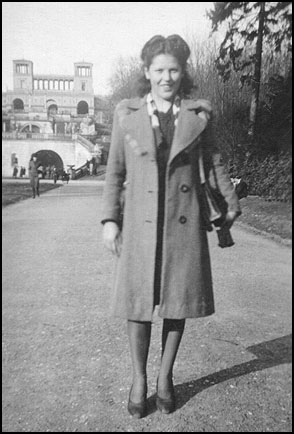
This is the Orangery Palace in Potsdam, and the inscription on the reverse says, “April 10, 1945.” One month to the end of the war. The Nazis still control this area; six more days to the start of the Berlin Strategic Offensive Operation.
Then they were moved farther and farther to the west with the retreating Germans and ended up within 18 km from the American occupation zone. They could go there, but they did not. “We really trusted Stalin.” They stayed in the Soviet zone and were all arrested, tried for treason, and sentenced to five years in prison and five more in exile. Grandmother was 21 at that moment.
The grandmother's sister went missing, and they never found her. Her brother, who was 11 by the end of the war, was apparently semi-adopted by someone in the Soviet Union because he lived with someone until his mother and sister got out of prison in five years — and that was not orphanage.
Apparently, he similarly lived with some German family in Germany because when we watched his personal photo album together, he pointed to a picture and said that was the family he lived with. Those people had five children of their own, and quite young ones. Three of them were raped by the Soviet soldiers. The parents cut their — children's — wrists after that.
The very same album had a picture of a German couple. The husband was executed by the Germans themselves for hiding a Russian escapee, and the wife, while pregnant, was raped by the Soviets, and then they cut her belly open.
Unlike life under the Nazis in the occupied Soviet Union, this portion of our glorious history was known to me way before — I could get it from the Western sources — never from the Russian ones, we do not rape pregnant women or any women at all, we only save humankind from the Nazi beast — but it is one thing to read about it in books and quite another thing to learn specific stories from your great-uncle, and not some abstract stories, not some political pamphlets, but just something associated with his photo album.
Another recollection by grandmother: when the Soviets took over, they mass executed some people in some kind of a hangar, and “blood was really flowing on the streets; not like a river — I will not lie — but like water runs on the pavement during a strong rain — do you believe me?”
next: Soviet Prison
more: Other Things
this page: http://www.zharov.com/kampf/war.html
copyright: © Sergei Zharov, text, design, code, 2004–2024
feedback: sergei@zharov.com
